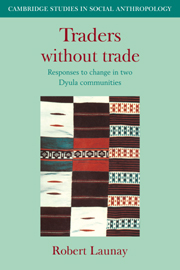Book contents
- Frontmatter
- Contents
- List of figures, maps and tables
- Preface
- 1 Introduction: the people and the problem
- PART I THE LEGACY OF THE PAST
- 2 Dyula and Senufo
- 3 Warriors, scholars and traders
- 4 Clansmen and kinsmen
- 5 The mechanics of marriage
- PART II RESPONSES TO CHANGE
- Notes
- Bibliography
- Index
- Cambridge Studies in Social Anthropology
3 - Warriors, scholars and traders
Published online by Cambridge University Press: 15 October 2009
- Frontmatter
- Contents
- List of figures, maps and tables
- Preface
- 1 Introduction: the people and the problem
- PART I THE LEGACY OF THE PAST
- 2 Dyula and Senufo
- 3 Warriors, scholars and traders
- 4 Clansmen and kinsmen
- 5 The mechanics of marriage
- PART II RESPONSES TO CHANGE
- Notes
- Bibliography
- Index
- Cambridge Studies in Social Anthropology
Summary
If the region as a whole was characterized by fairly intense ethnic specialization, with Senufo, Dyula and marginal groups of craftsmen each controlling different sectors, there was also a high degree of specialization within the Dyula group itself. Whereas, for the vast majority of Senufo, the primary occupation was the farming of staple cereals for subsistence, an individual Dyula was more likely to consider himself a warrior, a scholar or a trader. Yet it was possible for a Dyula to change his occupation, or to carry on more than one of these occupations at the same time. For example, a rich trader could arm his slaves, thereby commanding a small army with which to meddle in local politics or to wage war. On the other hand, he might turn over his business activities to his grown sons and spend his remaining days in the study of sacred texts. In such respects, Dyula social organization was extremely flexible. Despite this flexibility, however, these three occupations were not entirely equivalent. Of the three, trade was the most universal, as the very name ‘Dyula’ implies. Indeed, most Dyula engaged in trade of one form or another during at least part of their adult lives. But much of this trade was only of local importance; participation in the long-distance trade was the real mark of the specialized trader.
If any Dyula might become a trader, the same was far less true for the occupations of warrior and scholar.
- Type
- Chapter
- Information
- Traders Without TradeResponses to Change in Two Dyula Communities, pp. 25 - 47Publisher: Cambridge University PressPrint publication year: 1982



